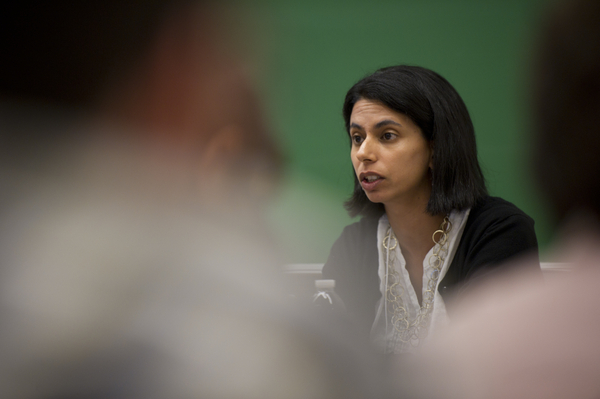Philosophy reframes today’s concerns

Last week, Northeastern hosted the 29th International Social Philosophy Conference, an opportunity for experts and students to weigh deep questions around some of the biggest issues of our time.
Sometimes finding a new way to look at an issue can help create new solutions, said Serena Parekh, an assistant professor of philosophy and religion in Northeastern’s College of Social Sciences and Humanities. Parekh presented a paper on bringing democracy to refugees during a panel Thursday, the first day of the three-day conference.
Parekh said that wealthy Western nations realize they must weigh the extent to which they can help refugees and other displaced or stateless people by taking some into their own borders.
“One thing that is agreed upon is the terms of the debate,” said Parekh, though the answers from individual countries vary. While it may seem optimal to have all parties sharing a perspective, that can be limiting because it prevents nations from considering alternative, out-of-the-box solutions.
Refugees as a whole, Parekh said, are excluded from democracy, both on a local and global level. “The heart of what it means to be stateless is to be rightless, in that you lack a community to protect your rights” she said.
Western nations, which ultimately take in just a tiny fraction of refugees, should instead look for ways to promote democracy and protect the rights of displaced and stateless people.
Professor of philosophy Stephen Nathanson, who organized the conference, presented a paper on how philosophy can broaden a discussion and reduce polarization between groups whose opinions are closer than they might seem. He pointed to remarks by President Barack Obama, who at the start of his term cited “philosophical differences” of opinion regarding the role of government in society as a major factor in politics and public discourse.
“These really are philosophical differences,” Nathanson said, discussing the apparent polarity between those on opposite ends of the political spectrum. “Philosophy is not something you find in old books or that gets discussed by weird people like ourselves. These are real issues in the real world.”
Nathanson discussed the broad spectrum of options for a government’s role in the economy, not simply capitalism and socialism. Presenting a broader array of options can reframe the debate and force people to reconsider their positions, which may not be as concrete as first considered, he said.
“When we see these issues in a ‘two poles’ kind of way, there are so few options that, of course, people are polarized,” Nathanson said. “But when we think about things along a broader spectrum, I think most people would realize that we aren’t so far away.”





